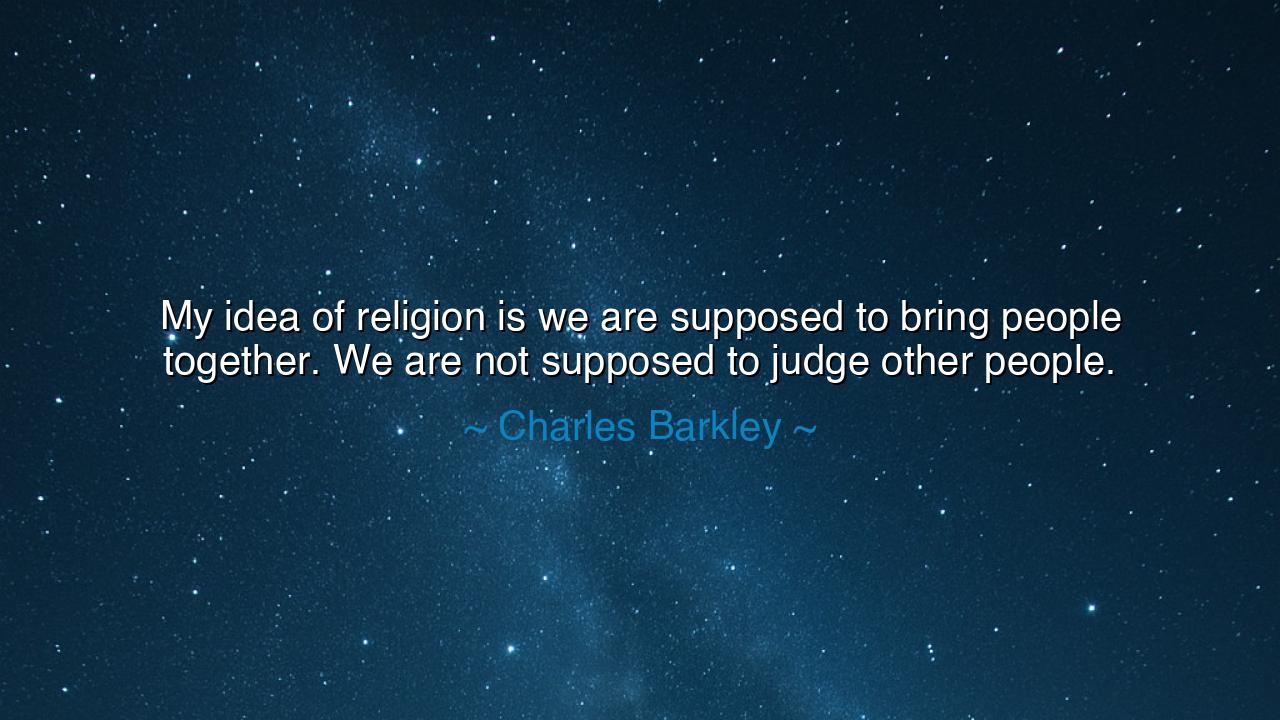
My idea of religion is we are supposed to bring people together.
My idea of religion is we are supposed to bring people together. We are not supposed to judge other people.






“My idea of religion is we are supposed to bring people together. We are not supposed to judge other people.” Thus spoke Charles Barkley, not from the pulpit of a temple but from the pulpit of experience—an athlete, a man of the world, who had seen the power of unity and the poison of judgment. His words, though simple, carry the weight of timeless truth. For they remind us that the heart of religion is not division, but connection; not judgment, but compassion. Religion, at its purest, was never meant to draw lines between souls—it was meant to remind us that we are one.
From the dawn of civilization, humanity has looked toward the heavens in wonder, seeking meaning beyond the dust and labor of daily life. But what was first a cry of awe became, in time, a cry of ownership. The sacred that should have united all hearts was broken into sects and symbols. People began to say, “My god, not yours. My truth, not yours.” Thus, the house of faith became a fortress, and the language of love was turned into the law of judgment. Yet, in every age, there have been voices like Barkley’s—voices that call us back to the original purpose: that religion should be a bridge, not a barrier.
Consider the life of St. Francis of Assisi, who walked barefoot among lepers, kings, and beggars, seeing no difference between them. When the Crusades raged and blood was spilled in the name of God, Francis crossed enemy lines unarmed, seeking to speak not as a warrior, but as a brother. He met with the Sultan of Egypt, and though they followed different creeds, they found friendship in shared humanity. Francis understood what Barkley later echoed: to judge is to divide, but to love is to heal. It was not the correctness of belief that mattered, but the presence of compassion.
Barkley’s words, though uttered in our modern age, reach back to this ancient wisdom. His idea of religion as unity springs not from doctrine, but from empathy. He saw that men often hide cruelty beneath the banner of righteousness. They use their faith not to uplift, but to condemn; not to serve, but to stand above. Yet every true prophet—from Buddha to Jesus, from Muhammad to Gandhi—spoke the same message: Judge not, for judgment blinds the heart; love one another, for love reveals the divine.
And what is judgment, if not blindness disguised as knowledge? When a man judges another, he closes his eyes to that person’s struggle, their pain, their story. He assumes the right to weigh another’s soul, forgetting that even he is still learning to know his own. The wise know that judgment withers understanding; only compassion makes it bloom. For as rivers flow to the same sea by many paths, so too do hearts find the divine through many journeys. The purpose of faith is not to declare which path is highest, but to walk together toward the light.
History has often shown us the cost of forgetting this truth. The wars of creed, the fires of intolerance, the walls built between neighbors—all are the fruit of judgment sown in the soil of pride. Yet even in such darkness, there have been glimmers of unity. When Martin Luther King Jr. stood upon the steps of the Lincoln Memorial, he did not preach a religion of division, though he was a minister. He spoke of a dream where all races, all creeds, all children of God would stand side by side. His dream was, in essence, the religion Barkley spoke of—a religion of togetherness, where justice and mercy walk hand in hand.
And so, my child of the changing world, let these words take root in your heart: Do not use your beliefs to separate yourself from others. Let them instead be the bridge by which you cross toward understanding. When you meet one who prays differently, speaks differently, or loves differently, do not ask, “What is wrong with them?” Ask instead, “What can I learn from them?” Every person is a reflection of the same divine spark, and every act of kindness fans its flame brighter.
Live, then, as one who gathers rather than scatters, who listens more than judges, who seeks harmony over victory. For in the end, it is not the temple we build, nor the scripture we recite, that proves our faith—it is the love we extend. When we lift another from the dust, when we forgive instead of condemn, when we open our arms to those unlike ourselves—then, and only then, do we understand what Barkley meant. Religion, in its truest form, is not belief—it is belonging. And he who brings others together walks already in the presence of the divine.






AAdministratorAdministrator
Welcome, honored guests. Please leave a comment, we will respond soon